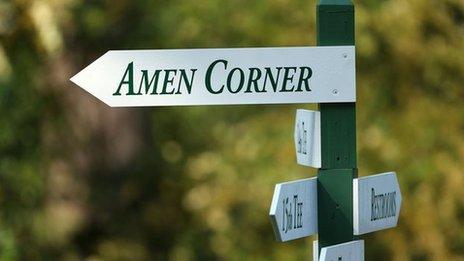Masters 2014: Inside the mind of a final-day Augusta contender
- Published
Masters 2013: Adam Scott wins play-off
The Masters begins on the back nine on Sunday. It has been said a thousand times, but that is because it rings true.
With Amen Corner, two par-fives reachable in two, and danger and opportunity everywhere, the Masters can be won and lost in a heartbeat.
Former US Ryder Cup captain Paul Azinger, fifth at the Masters in 1998, talks us through Sunday at Augusta from a contender's point of view.
The build-up
You play well on Saturday and are in contention with a real shot at winning the Masters.
"Saturday night is not a problem, it is the long wait before teeing off on Sunday. You wake up at 7am or 8am and you have until about 2pm. That is a long day.
"You can't keep the situation out of your mind. It jumps in every 10 minutes. You sit around or go for a walk but it's constantly there. That is the burden of the mental side of golf.
"If you really get down to the brass tacks of it all, a golf swing takes about a second and a half. If you shoot 70, that is little more than a minute and a half of actual motion. The rest of it is just thought. Six full minutes in four days. It can make your head explode."
The front nine
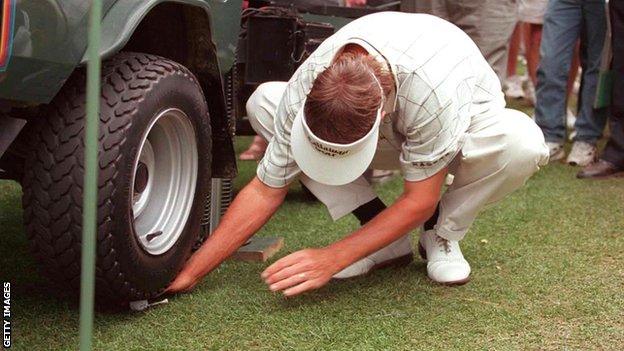
Paul Azinger found himself in trouble near the ninth green in 1997
Before you get to the fabled back nine, you must stay in one piece over the outward half.
"On this course, more than any other, you need to take a hard look at the hole locations before you tee off. They determine whether it is a par hole or a birdie opportunity, and that dictates where you drive. You need a strategy.
"Every hole is like a chess match with yourself. You are constantly off balance at Augusta.
"You can make six on number one in a heartbeat. With poor tee shots, disaster can strike on two, three and four. Five is defence all the way. Seven is so long, the tee shot is critical. The eighth is probably the only breather hole on the front nine."
Amen Corner
You are still hanging amongst the leaders as you enter the most famous stretch of holes in golf. The back nine at Augusta. This is it.
"Everybody knows the phrase 'the Masters doesn't start until the back nine on Sunday'. You try to ignore it, but it is in the back of your mind. Always.
"Amen Corner [holes 11, 12 and 13] is where you can really lose the tournament. Those holes are poisonous.
"You are so aware of the history. You are aware of the brilliance and you are aware of the heartache. You know Tom Weiskopf hit five in the water on 12, and Raymond Floyd put it in the water on 11 in the play-off.
"But you also know about the spectacular eagles on 13. So you have to stay in the present and try to come out of there at least one under. But factor in the pressure, it can end your dreams.
"The approach is situational. You have a good look at the leaderboard to the left of the 11th green. A healthy aggression is the philosophy here at Augusta. So you make your decisions based on your position.
"As a chaser, the Sunday hole location on 11 is usually close to the pond so it's difficult to attack. You want to get out of there with no damage. The 12th can be attacked, factoring in the risk that if you're long or short it will end your chances.
"If you are leading you have a totally different mindset. On 11 you avoid the pond at all costs. If the hole on 12 is cut to the right you hit it over the front bunker no matter what. Then if you are long or short you are in sand and can salvage par
"The legend has it that you look at the flag on the 11th green to determine what the wind is doing on 12. That's great in concept, but reality hits when the flag is blowing one way on 11 and you can feel it in your face from a different direction on the 12th tee.
"So while you think you are supposed to trust what you see on 11, you can't because the tee box is more exposed. Inevitably you trust what you feel. You try to execute, and you are at the mercy of the gods."
The par-fives - 13 and 15
The reachable par-fives are pivotal. They can launch your attack or sink your hopes in a flash. How do you approach them?
"The strategy on the 13th depends on your tee shot. If it is decent, and you are behind, you go for the green with your second. It's a difficult shot but could give you the opportunity for a three or four.
"If you are leading you still may go for it, if you like the lie and the distance. But you can have downslope or sideslope lies there which might make it too risky so you lay up to a good angle.
"On the 15th, you know if you hit a good tee shot you have an opportunity for birdie. If you are in position, you hit it over the pond in two, even if you are leading. You need that pond out of your mind.
"If you lay up, the third shot from short of the water is the hardest sand wedge shot on earth, and especially if you are in contention for the Masters. It is on a downslope, to a very narrow target. If you hit it nicely it can create enough spin to spin back into the water. If you gun it, there is not quite enough spin to hold the green and then you have to pitch back towards the water. It has to be perfectly struck.
"If you are leading, the safest place to be is in the right bunker with your second shot. I used to aim for it and try to pull a draw off the bunker. If you go for the pin in two with the hole cut on the left, the pond at the back comes into play. Even if you are short of the water, that is a terrible place to be because chipping back, the pond on 15 comes into play again.
"You can call it luck, you can call it the will of the golfing gods, but at Augusta, more than any place you will ever play, degrees and inches make all the difference in the world."
Dealing with the roars
The atmosphere down among the pines can be scintillating, with birdies and eagles dropping. Random explosions of noise erupt like geysers spouting at will. The roars reverberate around the pines. How do you keep calm among the maelstrom?
"Adrenalin is a real function of the body. It was designed to save your life. When you get these jolts, it is generally for a reason. Golf is not like other sports where adrenalin can be used. In golf, it's a spoiler.
"Controlling it is the tricky part. Psychologists will say the only way is to control your breathing to slow down your heart rate.
"I can remember trying to win the US PGA and I could feel my pulse pounding my fingertips because my heart was hitting the inside of my chest so hard because of the adrenalin.
"You are trying to make history - OK, it is not life or death, but it is what you do. So you must try to embrace it. If you can't embrace it then you should go and do something different.
"It comes through experience. You must fail a few times before you begin to understand the nature of that and a willingness to accept it.
"When I was playing, I would look at the names on the leaderboard - were they friends, did I even know them? I always tried to remind myself they were feeling the same thing I was. My goal was to try to control it better than them. We are all people, you are not alone when you feel that.
"The caddie can play an integral part. You can be real candid and let him know how you are feeling. A lot of times admitting how nervous you are can relieve the pressure. The caddie can change the subject or distract your mind from the pressure of what you are trying to accomplish. He can take the burden off you, remind you of things you hadn't thought of."
The 18th
You reach 18 and the tournament is on the line. You push the tee into the ground, place the ball on top and peer down that narrow chute of trees. This is it. One more drive…
"Control your breathing. Visualise and remind yourself you've done this thousands of times before. Talk to yourself if it helps. Commit to a spot and a ball flight and let it rip, don't hold back.
"The Masters amps up the pressure but it is the same trying to win any tournament. I would transport my mind to the driving range at my home club.
"There was a pump house way out at the far end which I used to aim at all the time. So I would think to myself that if this was my home track I would never miss that pump house more than a few yards either side. I would actually see it in my mind and try to drive the ball at the pump house.
"But make sure you know the yardage. Those bunkers are really hard to play from. It takes a special kind of golf swing to get it up over that lip and reach the flag stick like Sandy Lyle did in 1988."
The mindset

"I remember watching Trevor Immleman when he won in 2008. I thought he would throw up for sure in the middle of the fairway."
Do you have what it takes? Are you willing to stand out and grasp the glory?
"The concept that some guys are afraid to win is 100% true. It is part of the burden, and it is magnified in the majors. A lot of players have the skill level, but looking down the leaderboard, you know the characters and know that victory is unlikely.
"You have to put all the what ifs behind you, stay in the present and execute.
"I remember watching Trevor Immelman when he won in 2008., external I thought he would throw up in the middle of the fairway. You could see his head down, the walk, it was as if the suffering of what was going on in his head, and the pain in his stomach, was making him physically sick.
"I wonder now, later in his career, if he could reflect and be perfectly honest that he might have been nauseated he felt so much pressure.
"But he did it, and when you've done it once, you will never feel it again. You have proven you can do it and it changes your whole mindset. It is like: 'I know I can do it, you know I can do it, and I know you know I can do it.'
"The difference at Augusta, because it is the only major at the same place, is you know what has happened before.
"The Masters is the past meeting the present. That can be a big burden."
Follow live text commentary on the Masters final round on the BBC Sport website from 16:00 BST, watch live coverage on BBC Two from 18:30 BST and listen to live commentary from BBC Radio 5 live from 20:30 BST.
You can also watch further in-depth action from Augusta National with up to seven live video streams available on your mobile, tablet, desktop and Connected TV. Full coverage details here.
- Published11 April 2014
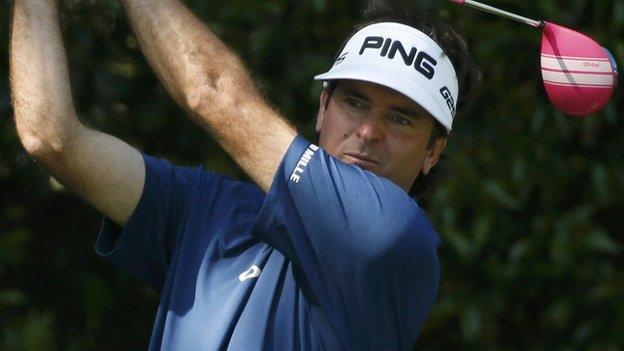
- Published12 April 2014
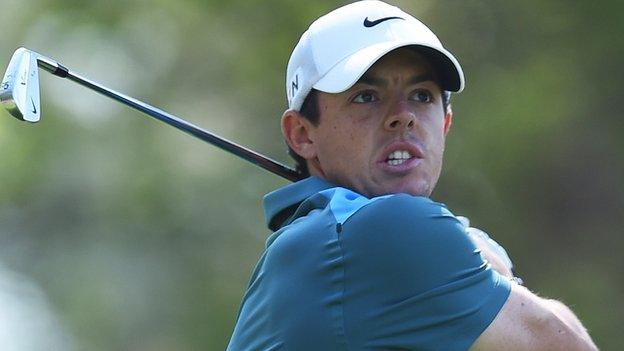
- Published9 April 2014
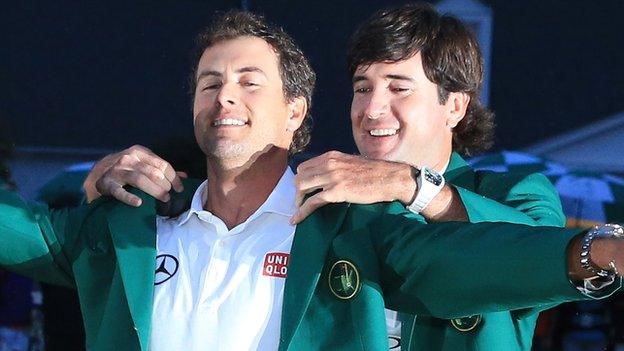
- Published9 April 2014
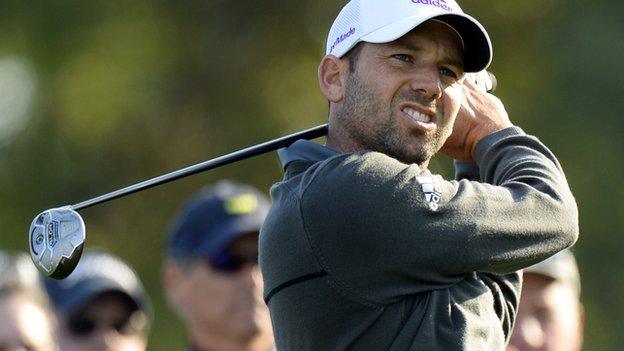
- Published7 April 2014
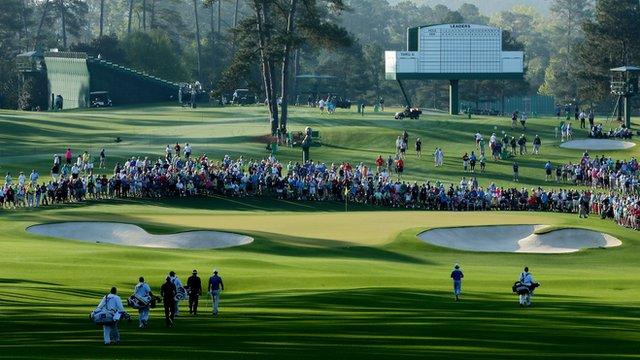
- Published10 April 2014
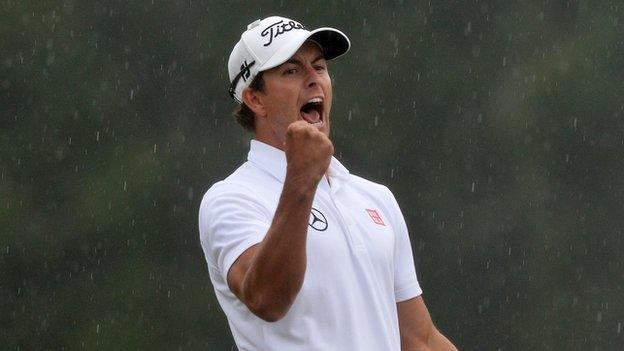
- Published14 April 2013
